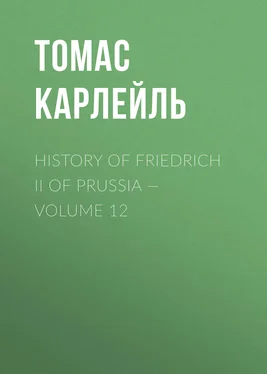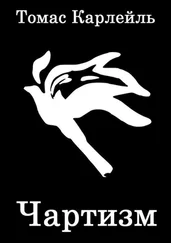Томас Карлейль - History of Friedrich II of Prussia — Volume 12
Здесь есть возможность читать онлайн «Томас Карлейль - History of Friedrich II of Prussia — Volume 12» — ознакомительный отрывок электронной книги совершенно бесплатно, а после прочтения отрывка купить полную версию. В некоторых случаях можно слушать аудио, скачать через торрент в формате fb2 и присутствует краткое содержание. Жанр: foreign_prose, История, literature_19, foreign_edu, foreign_antique, на английском языке. Описание произведения, (предисловие) а так же отзывы посетителей доступны на портале библиотеки ЛибКат.
- Название:History of Friedrich II of Prussia — Volume 12
- Автор:
- Жанр:
- Год:неизвестен
- ISBN:нет данных
- Рейтинг книги:3 / 5. Голосов: 1
-
Избранное:Добавить в избранное
- Отзывы:
-
Ваша оценка:
- 60
- 1
- 2
- 3
- 4
- 5
History of Friedrich II of Prussia — Volume 12: краткое содержание, описание и аннотация
Предлагаем к чтению аннотацию, описание, краткое содержание или предисловие (зависит от того, что написал сам автор книги «History of Friedrich II of Prussia — Volume 12»). Если вы не нашли необходимую информацию о книге — напишите в комментариях, мы постараемся отыскать её.
History of Friedrich II of Prussia — Volume 12 — читать онлайн ознакомительный отрывок
Ниже представлен текст книги, разбитый по страницам. Система сохранения места последней прочитанной страницы, позволяет с удобством читать онлайн бесплатно книгу «History of Friedrich II of Prussia — Volume 12», без необходимости каждый раз заново искать на чём Вы остановились. Поставьте закладку, и сможете в любой момент перейти на страницу, на которой закончили чтение.
Интервал:
Закладка:
The Gotter Negotiation at Vienna, which we saw begin there that wet Sunday, is now fast ending, as good as ended; without result except of a negative kind. Gotter's Proposals,—would the reader wish to hear these Proposals, which were so intensely interesting at one time? They are fivefold; given with great brevity by Friedrich, by us with still greater:—
1. "Will fling myself heartily into the Austrian scale, and endeavor for the interest of Austria in this Pragmatic matter, with my whole strength against every comer.
2. "Will make treaty with Vienna, with Russia and the Sea-Powers, to that effect.
3. "Will help by vote, and with whole amount of interest will endeavor, to have Grand-Duke Franz, the Queen's Husband, chosen Kaiser; and to maintain such choice against all and sundry. Feel myself strong enough to accomplish this result; and may, without exaggeration, venture to say it shall be done.
4. "To help the Court of Vienna in getting its affairs into good order and fencible condition,—will present to it, on the shortest notice, Two Million Gulden (200,000 pounds) ready money."—Infinitely welcome this Fourth Proposition; and indeed all the other Three are welcome: but they are saddled with a final condition, which pulls down all again. This, which is studiously worded, politely evasive in phrase, and would fain keep old controversies asleep, though in substance it is so fatally distinct,—we give in the King's own words:
5. "For such essential services as those to which I bind myself by the above very onerous conditions, I naturally require a proportionate recompense; some suitable assurance, as indemnity for all the dangers I risk, and for the part (ROLE) I am ready to play: in short, I require hereby the entire and complete cession of all Silesia, as reward for my labors and dangers which I take upon myself in this course now to be entered upon for the preservation and renown of the House of Austria;"—Silesia all and whole; and we say nothing of our "rights" to it; politely evasive to her Hungarian Majesty, though in substance we are so fatally distinct. [Preuss, Thronbesteigung, p. 451; "from Olenschlager, Geschichte des Interegni [Frankfurt, 1746], i. 134."]
These were Friedrich's Proposals; written down with his own hand at Reinsberg, five or six weeks ago (November 17th is the date of it); in what mood, and how wrought upon by Schwerin and Podewils, we saw above. Gotter has fulfilled his instructions in regard to this important little Document; and now the effect of it is—? Gotter can report no good effect whatever. "Be cautious," Friedrich instructs him farther; "modify that Fifth Proposal; I will take less than the whole, 'if attention is paid to my just claims on Schlesien.'" To that effect writes Friedrich once or twice. But it is to no purpose; nor can Gotter, with all his industry, report other than worse and worse. Nay, he reports before long, not refusal only, but refusal with mockery: "How strange that his Prussian Majesty, whose official post in Germany, as Kur-Brandenburg and Kaiser's Chamberlain, has been to present ewer and towel to the House of Austria, should now set up for prescribing rules to it!" A piece of wit, which could not but provoke Friedrich; and warn him that negotiation on this matter might as well terminate. Such had been his own thought, from the first; but in compliance with Schwerin and Podewils he was willing to try.
Better for Maria Theresa, and for all the world how much better, could she have accepted this Fifth Proposition! But how could she,—the high Imperial Lady, keystone of Europe, though by accident with only a few pounds of ready money at present? Twenty years of bitter fighting, and agony to herself and all the world, were necessary first; a new Fact of Nature having turned up, a new European Kingdom with real King to it; NOT recognizable as such, by the young Queen of Hungary or by any other person, till it do its proofs.
WHAT BERLIN IS SAYING; WHAT FRIEDRICH IS THINKING
What Friedrich's own humor is, what Friedrich's own inner man is saying to him, while all the world so babbles about his Silesian Adventure? Of this too there are, though in diluted state, some glimmerings to be had,—chiefly in the Correspondence with Jordan.
Ingenious Jordan, Inspector of the Poor at Berlin,—his thousand old women at their wheels humming pleasantly in the background of our imaginations, though he says nothing of that,—writes twice a week to his Majesty: pleasant gossipy Letters, with an easy respectfulness not going into sycophancy anywhere; which keep the campaigning King well abreast of the Berlin news and rumors: something like the essence of an Old Newspaper; not without worth in our present Enterprise. One specimen, if we had room!
JORDAN TO THE KING (successively from Berlin,—somewhat abridged.)
No. 1. "BERLIN, 14th DECEMBER, 1740 [day after his Majesty left]. Everybody here is on tiptoe for the Event; of which both origin and end are a riddle to the most. I am charmed to see a part of your Majesty's Dominions in a state of Pyrrhonism; the disease is epidemical here at present. Those who, in the style of theologians, consider themselves entitled to be certain, maintain That your Majesty is expected with religious impatience by the Protestants, and that the Catholics hope to see themselves delivered from a multitude of imposts which cruelly tear up the beautiful bosom of their Church. You cannot but succeed in your valiant and stoical Enterprise, since both religion and worldly interest rank themselves under your flag.
"Wallis," Austrian Commandant in Glogau, "they say, has punished a Silesian Heretic of enthusiastic turn, as blasphemer, for announcing that a new Messiah is just coming. I have a taste for that kind of martyrdom. Critical persons consider the present step as directly opposed to certain maxims in the ANTI-MACHIAVEL.
"The word MANIFESTO—[your Majesty's little PATENT on entering Silesia, which no reader shall be troubled with at present]—is the burden of every conversation. There is a short Piece of the kind to come out to-day, by way of preface to a large complete exposition, which a certain Jurisconsult is now busy with. People crowd to the Bookshops for it, as if looking out for a celestial phenomenon that had been predicted.—This is the beginning of my Gazette; can only come out twice a week, owing to the arrangement of the Posts. Friday, the day your Majesty crosses into Silesia, I shall spend in prayer and devotional exercises: Astronomers pretend that Mars will that day enter"—no matter what.
NOTE, The above Manifesto rumor is correct; Jurisconsult is ponderous Herr Ludwig, Kanzler (Chancellor) of Halle University, monster of law-learning,—who has money also, and had to help once with a House in Berlin for one Nussler, a son-in-law of his, transiently known to us;—ponderous Ludwig, matchless or difficult to match in learning of this kind, will write ample enough Deductions (which lie in print still, to the extent of tons' weight), and explain the ERBVERBRUDERUNG and violence done upon it, so that he who runs may read. Postpone him to a calmer time.
No. 2. "BERLIN, SATURDAY, 17th DECEMBER. Manifesto has appeared,"—can be seen, under thick strata of cobwebs, in many Books; [In Helden-Geschichte, i. 448, 453 (what Jordan now alludes to); IB. 559-592 ["Deduction" itself, Ludwig in all his strength, some three weeks hence; in OLENSCHLAGER (doubtless); in &c. &c.] is not worth reading now: Incontestable rights which our House has for ages had on Schlesien, and which doubtless the Hungarian Majesty will recognize; not the slightest injury intended, far indeed from that; and so on!—"people are surprised at its brevity; and, studying it as theologians do a passage of Scripture, can make almost nothing of it. Clear as crystal, says one; dexterously obscure by design, says another.
Читать дальшеИнтервал:
Закладка:
Похожие книги на «History of Friedrich II of Prussia — Volume 12»
Представляем Вашему вниманию похожие книги на «History of Friedrich II of Prussia — Volume 12» списком для выбора. Мы отобрали схожую по названию и смыслу литературу в надежде предоставить читателям больше вариантов отыскать новые, интересные, ещё непрочитанные произведения.
Обсуждение, отзывы о книге «History of Friedrich II of Prussia — Volume 12» и просто собственные мнения читателей. Оставьте ваши комментарии, напишите, что Вы думаете о произведении, его смысле или главных героях. Укажите что конкретно понравилось, а что нет, и почему Вы так считаете.









